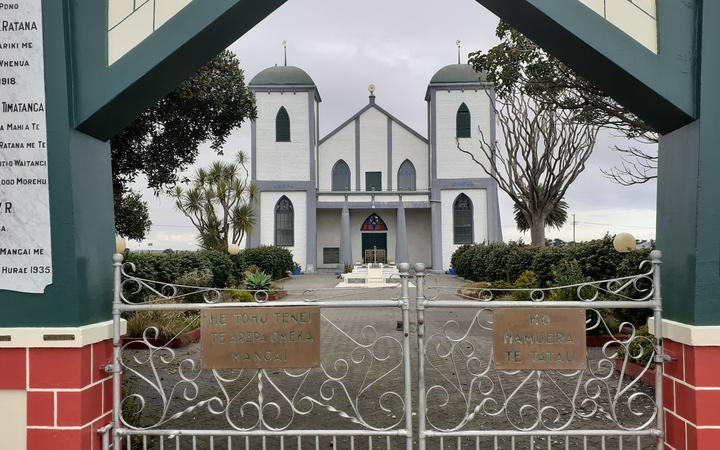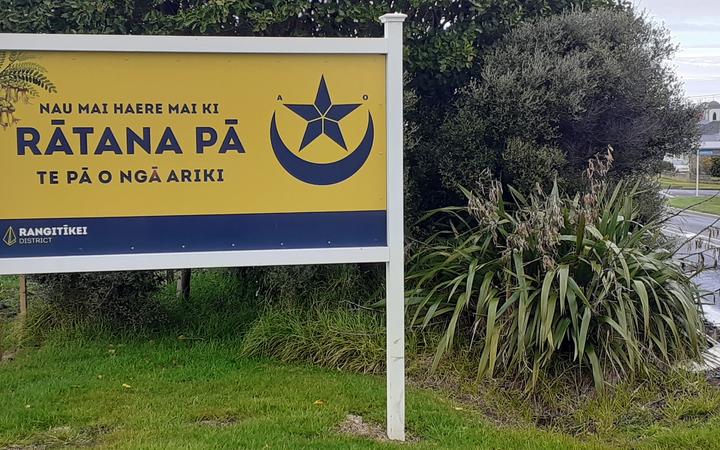The historic Rātana celebrations have been scaled back for a second year running to a one-day event for the local community.

Whakamoemiti at the temple at Rātana Pā on 25 January will be a local community event requiring vaccine passes, photo ID and masks. Photo: LDR / Moana Ellis
Thousands of Rātana followers, politicians and dignitaries have been asked to stay away because of the threat of Covid-19 and most traditional activities have been called off.
The formal procession from the marae to the whakamoemiti service in the temple will go ahead on 25 January followed by speeches at the marae, but Rātana leaders say there will be strict safety precautions.
On Monday, the Office of the Rātana Established Church announced the service would be a “vaccinated event” for those with vaccine passes, photo identification and masks. The office said local volunteers would check passes and IDs.
It also asked followers outside of Rātana to stay home and hold whakamoemiti in their own parishes to keep the community safe.
The Rātana Komiti Marae has cancelled all other events usually held over several days.
Head of Paepae Kamaka Manuel said the decision was made for safety reasons.
“Very tough decision, largely based on the restrictions and the current climate in terms of Covid appearing across the country,” Manuel said.
“Our Rātana 25th hui are always attended by thousands of people and that [would] put those who attend at risk. It was a very, very hard decision to make for our people but one based on aligning with the Ministry of Health guidelines around Covid and ensuring that we keep not only ourselves safe here at home in the Rātana community but also all of our fellowship in the wider motu.”

Rātana leaders have asked followers to stay home this year because of Covid-19. Photo: LDR / Moana Ellis
The annual pilgrimage of Rātana followers marks the birth of Tahupōtiki Wiremu Rātana, the founder of the Rātana Church and movement.
Manuel said this year’s cancellations would impact heavily on the Rātana faithful.
“It’s the one major hui that many of our whānau mark every year on their calendar. It’s most important for them to begin their year with their attendance to recharge ā-tīnana, ā-wairua – it’s the norm. When that’s a cycle that’s been happening for generation after generation, [cancellation] will have a huge impact for our whānau.
“This is only the second time that this has happened. Such is the impact of this ngāngara. We know that Covid is pretty much here to stay. How do we now manage our pathways forward?
“What had to be counted into the decision was the fact that although we are in orange of the traffic light system, there are still people who belong to our hāhi who come from areas that are in red.
“One of the things about our hāhi and our mōrehu [followers] is that many of them come from very high risk areas.”
Manuel said the event had historically heralded the start of the political year, with politicians taking the opportunity to address Māoridom.
“It’s that first national hui for the politicians, for Māoridom, followed by Waitangi up in the north. But the onus has to be around keeping everybody safe.
“This year we won’t see the official attendance by politicians, dignitaries and the huge media presence, but there are a number of politicians who affiliate strongly to the hāhi who may attend.
“We will still have a strong contingent of our mōrehu heading down to the temepara, in the temepara for whakamoemiti and then returning from the temepara to the marae for the paepae to engage in some mihi – there will still be an aspect of that continuing.”

Local Democracy Reporting is a public interest news service supported by RNZ, the News Publishers’ Association and NZ On Air.